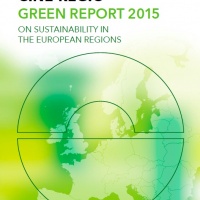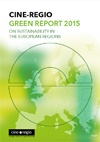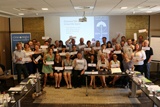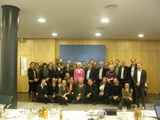Year 2015
Regional meeting in Hamburg, Oct 1st, 2015
At the meeting there was a presentation of Nordnorsk Filmsenter, one of our new members. We were introduced to RE-ACT: a new initiative aimed at developing & fostering international co-productions between two or more regions. We also listened to Mrs. Pauline Burt, Ffilm Cymru Wales, who presented a new project called “Magnifier - making the most of good ideas"; a project about identifying the potential value of film projects early.
There was also several announcements from the Cine-Regio subgroups.
Article from San Sebastian Film Festival, Sept 21st, 2015
San Sebastian Film Festival made an interview with Charlotte Appelgren and Clara Montero where they answer questions such as: How collaborate to make films in minority languages more visible? How find partners for co-productions? How share strategies to gain better access to the European cultural market?

Encouraging Green actions
Cineregio's subgroup, Green Regio, focus on environmental issues related to filmmaking activities. According to France's green film initiative, Ecoprod, the audiovisual sector emits approximately the equivalent of 1 million tons of CO2 into the atmosphere, every year, around a quarter of which is directly connected to filmmaking activities.
In preparation for The COP21 in Paris, the editor of the Cineregio 2015 Green Report (download here), Birgit Heidsiek from Greenshooting, Hamburg has put together a new Green report (download here). The report lists a variety of green initiatives implemented across the globe, incl those by Cineregio members.
Green Report 2015. On sustainability in European Regions
On May 18th, 2015, the new Green Report was made available to the public.
The report provides an overview of the green activities of the European film industry, enabling discussions on the various approaches to sustainable filmmaking, enabling searching for new and different green methods and opportunities and inspiring members to develop new directions for further activities.
General Assembly, 18th of May, 2015
At the General Assembly held in Cannes, CineRegio elected four new members for CineRegio Board.
Michael Gubbins made a presentation of CineRegio's new Focus Report: "Building Bridges: Diversity in European Film".
Also, Julio Talavera from the European Audiovisual Observatory, was invited as guest speaker make a presentation of LUMIEREPRO, a database for cinema admissions of films.
At the end of the meeting, the members and special guests from the film industry and European institutions gathered for the celebreation of the 10th anniversary.
Opening Industry Day during the Financial Forum for Kids Content, 2015
On March 10th, 2015, Kids-regio, in collaboration with the Swedish Film Institute, held the Opening Industry Day in Malmö, Sweden, where the focus was "The Long Tail: Children's Films and its Success Models - Perspectives between Commercial and Cultural Efforts".
Animarco Regio Meeting, Lyon, 5th of March, 2015
On the 5th of March, Animarco Regio met in Lyon where they shared information about the first experiences of the Canada-Wallimage Interactive Fund and discussed the possibility of a Canada-CineRegio Content fund.
Also the challenges in the animation value chain were discussed.
Strategic Meeting in Berlin, 9th of February, 2015
At the meeting, the General Secretary announced that at Berlinale 2015, 25 features and 6 short films were supported by CineRegio members, which represents 29% of all the European Films selected in all sections.
The meeting had two guest speakers, Ansgar Held & Sophie de Vinck from the European Commission who were invited to discuss about the implementation of General Block Exemption Regulation for the audiovisual and issues on applying the rules.
Mrs. Clara Montero from Basque Film Fund, held a presentation about minority languages and collaboration, as a start for a line of ork to foster platforms to share experiences and challenges with institutions and professionals in other European regions and member states that have minority languages or are multilingual.








